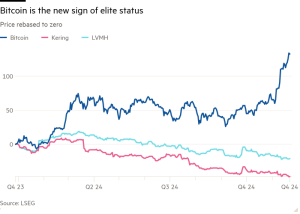UK water regulator could be scrapped in ‘root and branch’ review
Unlock the Editor’s Digest for free
Roula Khalaf, Editor of the FT, selects her favourite stories in this weekly newsletter.
Water regulator Ofwat could be overhauled or even replaced under the most far-reaching review of the industry since it was privatised 35 years ago.
A new commission will carry out a “root and branch” assessment that will consider all options for the regulation of the industry, environment secretary Steve Reed said, while also declaring that the “whole water sector has failed”.
“If we had better regulation I don’t think the water sector would be in the state that it is in today,” he told the FT, adding that oversight has “not been robust enough”.
The commission will be chaired by former deputy governor of the Bank of England Sir Jon Cunliffe and will look at strategic planning, protecting consumer interests, and how to come up with rules that hold companies to account without putting off potential investors.
However, it will stop short of considering whether the sector should be renationalised.
Reed said he was open-minded about whether the regulator is eventually scrapped.
“It’s a root and branch review, they will be looking at the regulators and regulation to see what is appropriate for the future,” he said. “I don’t have a fixed view. This is a genuinely independent commission making proposals for what needs to work in the future.”
David Black, chief executive of Ofwat, said they welcomed the review and looked forward to working with the government “on the change that is needed to drive better outcomes for customers and the environment”.
The water industry in England and Wales is facing huge challenges and public acrimony, with creaking infrastructure, rising bills and regular sewage leakages.
Providers are saddled with debt, with the largest company Thames Water is on the brink of collapse. Meanwhile, Britain could face some water shortages by the mid-2030s without new reservoirs being built.
“The whole water sector has failed,” said Reed. “They failed the public, they failed their customers, they failed their investors and they failed the environment.”
However he refused to comment on Thames, which has said it needs a more generous settlement from Ofwat to survive in the coming weeks.
“It would be extremely inappropriate for me to put pressure on either side of an independent negotiation,” he said.
The environment secretary has already secured an agreement from Ofwat and the industry to ring fence money for infrastructure upgrades so it cannot be diverted into shareholder payouts and bonus payments.
He has also introduced a water bill with new measures to restrict bonuses where environmental standards are not met and to bring criminal charges against persistent lawbreakers.
He said the Cunliffe review is “the first comprehensive review of the sector for 35 years” and “an attempt to reset the entire sector and forge a new partnership with government and investors”.
But he dismissed the idea that the review should consider renationalisation, saying that it would be a “means of delaying coming up with solutions that will actually work”.
He pointed to a recent report that warned that — without intervention — the 2030s could see “the demand for clean drinking water will start to outstrip supply and that means people won’t always have access to clean drinking water in the way they currently don’t in some parts of the Mediterranean”.
The water regulator currently carries out five-year price reviews for the sector that govern how far companies can raise bills in order to meet spending requirements.
Ofwat is currently haggling with water companies over the next five-year period, which runs to 2030. The industry had asked for a 29 per cent increase, and expressed fury after an interim ruling in July favouring a 19 per cent rise.
Earlier on Tuesday the regulator signalled its final ruling in the new year will be at a higher level — in line with usual precedent — after the industry argued it needed even more money to invest its ailing infrastructure.
Reed said that the five-year process could be replaced, depending on what Cunliffe commission recommends. “It may be that there’s a better way of taking decisions and regulating the sector that allows it to be more responsive, more creative, more innovative and more dynamic,” he said.
One of the biggest challenges facing the government is how to continue attracting private investment into the industry when Ofwat — which is independent of ministers — is not allowing companies to lift bills by as much as they want.
Critics of the industry point out that the 16 water monopolies have paid out £78bn in dividends in the 32 years between privatisation in 1991 and March 2023, according to research by the Financial Times. Meanwhile the companies, which were privatised with zero debt, have chalked up more than £64bn of borrowing.
Yet at a recent round table in London, several water investors — including Singapore sovereign wealth fund GIC — complained to Reed that they had been deterred from investing in UK infrastructure because of what they saw as Ofwat’s intransigence over water bills.
#water #regulator #scrapped #root #branch #review






